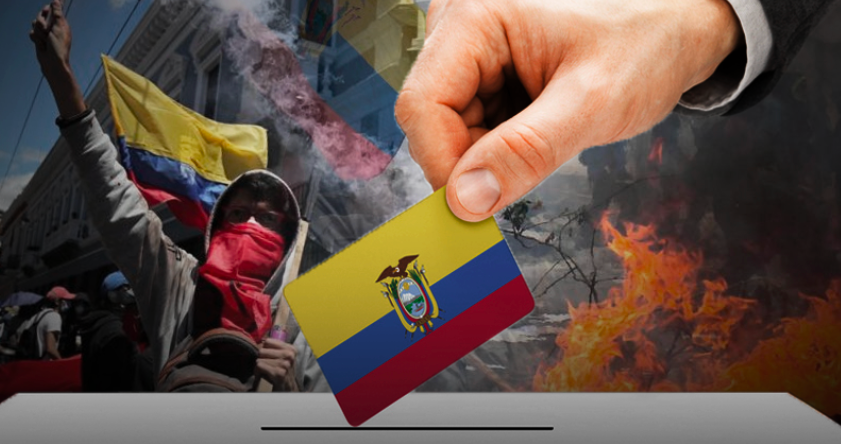By Oscar Rotundo*
The neoliberal project developed by Lenin Moreno and Guillermo Lasso has led Ecuador to a decomposition, which in turn permitted narco-paramilitarism to break into the political life of the nation in a scandalous manner.
The assassination of political leaders, journalists and the prison massacres in Ecuador in 2023 are a concrete examples of how the lack of presence of the formal State in the life of society has given way to the visibility of a Failed State for popular aspirations.
It is not just an economic problem. This has been exceeded by the lack of security in the daily life of Ecuadorians who suffer from the actions of criminal groups, who not only strip them of their belongings, but also kill them for no reason and given the ineffectiveness of the government to control this scourge.
According to the Ecuadorian Ministry of the Interior, between January 1 and March 15, 2023, 1,356 violent deaths were registered in the country, which represents an increase of 66.4% compared to the same period in 2022. The homicide rate per 100,000 inhabitants is 19.83. Most of the violent deaths were registered in the provinces of Guayas (417), Pichincha (300) and Manabí (112).
The main reasons for violent deaths are settling gangs scores among each other, family conflicts and robberies. The neoliberal government resorts to a repressive response by implementing a series of measures to reduce violence, which only raise the level of conflict that exists in the streets.
Increasing the number of police officers, improving police infrastructure, and strengthening criminal investigation units are not the appropriate response to reduce violence.
It is often repeated that prisons are a reflection of what happens in society. During 2023, there have been 10 prison riots in Ecuador, which have left a balance of 455 dead and 1,200 injured. The most violent riot occurred on July 23, 2023 at the Litoral Penitentiary, in Guayaquil, which left 123 dead and 88 injured.
Prison riots in Ecuador occur due to a number of factors, including:
- The presence of criminal gangs in prisons
- Overcrowding
- Corruption
The government thinks that the application of the state of emergency, the deployment of the military and police to prisons or the separation of members of criminal gangs can achieve the pacification of a society subjected to abandonment, inequality and contempt by the traditional political class that does not mind continuing to do business at the expense of the survival of the population.
Ecuador in the international arena is treated as a democratic country. But what kind of democracy permits more than 10 assassination of representatives of different political parties in 2023. These have taken place in the provinces of Pichincha, Guayas , Manabí, Esmeraldas and Los Ríos.
Many of them were officials or candidates, such as Agustín Intriago, mayor of Manta (Guayas), Ryder Sánchez, candidate for assembly for the province of Esmeraldas, Fernando Villavicencio, presidential candidate for the ruling party, Pedro Briones, leader of Revolución Ciudadana, Estefany Puente, candidate for assembly for the province of Manabí, Quinto Pazmiño, political adviser to the Ministry of Economy under the direction of Ricardo Patiño, Major Christian Granizo, police chief of the Samborondón district, and Corporal Christian Enríquez, his aide-de-camp, the candidates for mayor Omar Menéndez and Julio César Farachio, among others.
Journalists who denounce the atrocities committed by the government and the corruption schemes that surround it are threatened, persecuted or assassinated, like the journalists Mike Cabrera, Gerardo Delgado and César Vivanco.
Today we were told that the journalist and researcher Andrés Durán from the communication outlet Hoja de Ruta Radio, has received death threats for exposing all the lies and government negotiations.
Journalists Anderson Boscán and Mónica Velásquez from the media outlet La Posta, who revealed an alleged corruption scheme in the government of Guillermo Lasso, had to leave the country on July 26 due to threats and the arrival in the country of a group linked to with the Albanian mafia that would have arrived in Ecuador with instructions to attempt against their lives.
Three transnational criminal groups operate in Ecuador: The Mexican Sinaloa and Jalisco Nueva Generación cartels and the Albanian Balkan mafia.
These criminal groups cannot carry out their activities and operations without collusion with high-level government officials.
Neoliberalism and its government of bankers have turned Ecuador into a Failed State that does not meet the basic requirements to provide basic services to its citizens, such as security, health, education, infrastructure, and justice. Failed states are often characterized by violence, poverty, corruption, and political instability.
Both Moreno and Lasso, either due to laziness or negligence, have been incapable of controlling the territory, leaving a large part of it in the hands of narco-paramilitary groups, depriving the population of the possibility of developing their lives in peace and tranquility and have been permeated by widespread corruption that has deepened political instability, undermining the rule of law.
That is why, in these early elections, something much more important is at stake than breaking with a failed, unequal and mafia model – the possibility of refounding Ecuador is at stake and making it a country that rebuilds the rule of law.
The elections next Sunday, August 20, may be an opportunity, but the shadow of the mafia state will continue to haunt the new authorities, since the damage that has been inflicted on the country is multiplying in a plot that requires political audacity and active participation of the population to find the course of greatness abandoned several years ago.
* International political analyst and editor of the PIA Global team.

















Leave a Reply